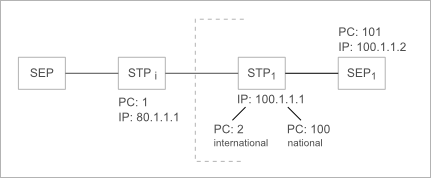SCCP address translation
From Yate Documentation
(Difference between revisions)
(→Routing between SCCPs) |
(→Routing between SCCPs) |
||
| Line 163: | Line 163: | ||
^10955311572$=local;RemotePC=1;sccp=sccp_international | ^10955311572$=local;RemotePC=1;sccp=sccp_international | ||
| − | See also: | + | '''See also:''' |
*[[SCCP decoder]] | *[[SCCP decoder]] | ||
*[[STP SCCP configuration]] | *[[STP SCCP configuration]] | ||
Revision as of 16:10, 26 October 2017
SCCP can be used to change the network type of the messages. An example for this is passing from an international to a national network.
In order to achieve this you must create a SCCP entity for each network type.
To configure SCCP address translation you must define:
- MTP interconnections
- SS7 Routers
- SS7 Management
- SCCP
- SCCP Management
- GTT
Contents |
Network schema overview
- In a basic setup we would have two STPs:
- a remote STP (STPi) that sends traffic
- a local STP (STP1) that does the translation
- and a SEP that processes the SCCP messages (SEP1)
Both STPs have unique international pointcodes. The SEP has a pointcode addressable only from the internal national network.
We'll be configuring STP1.
Configuration
Layer 1
In sigtransport.conf
[sctp:stp-stpi] type=sctp local=100.1.1.1:2094 remote=80.0.0.1:2094 stream=false [sctp:stp-sep] type=sctp local=100.1.1.1:2095 remote=100.1.1.2:2095 stream=false
Layer 2
In ysigchan.conf
[m2pa:stp-stpi] type=ss7-m2pa sig=sctp:stp-stpi [m2pa:stp-sep] type=ss7-m2pa sig=sctp:stp-sep
Layer 3
In ysigchan.conf
[ls:stp-stpi] type=ss7-mtp3 netind2pctype=ITU netindicator=international local=ITU:2 adjacent=ITU:1 link=m2pa:stp-stpi [ls:stp-sep] type=ss7-mtp3 netind2pctype=ITU netindicator=national local=ITU:100 adjacent=ITU:101 link=m2pa:stp-sep
SS7 routers
; We have two SS7 Routers, one for each netindicator type [router-international] type=ss7-router local=ITU,2 netindicator=international transfer=yes management=mgm-internat [router-national] type=ss7-router local=ITU,100 netindicator=national transfer=yes management=mgm-national
SS7 Management
; Define the SS7 management for each of them [mgm-internat] type=ss7-snm local=ITU,2 netindicator=international changesets=yes router=router-international [mgm-national] type=ss7-snm local=ITU,2 netindicator=national changesets=yes router=router-national
SCCP
; Define SCCP one for each router [sccp-international] type=ss7-sccp pointcodetype=ITU netindicator=international localpointcode=2 router=router-international management=sccp-mgm-internat [sccp-national] type=ss7-sccp pointcodetype=ITU netindicator=national localpointcode=100 router=router-national management=sccp-mgm-nat
SCCP Management
; Define SCCP Management for each SCCP [sccp-mgm-internat] type=ss7-sccp-itu-mgm [sccp-mgm-nat] type=ss7-sccp-itu-mgm
GTT
; Define GTT for each SCCP [gtt-international] type=ss7-gtt sccp=sccp_international debugname=GTT-international [gtt-nat] type=ss7-gtt sccp=sccp_national debugname=GTT-national
Routing between SCCPs
When routing messages between the two SCCPs on the same machine the sccp parameter with the name on the SCCP component that will send the message to the destination must be added.
Example in regexroute.conf:
[extra] sccp.route=110,gt,gtt [gtt] ; Route GT from international SCCP ^4074012345$=local;RemotePC=101;sccp=sccp_national ; Route GT from national SCCP ^10955311572$=local;RemotePC=1;sccp=sccp_international
See also:
